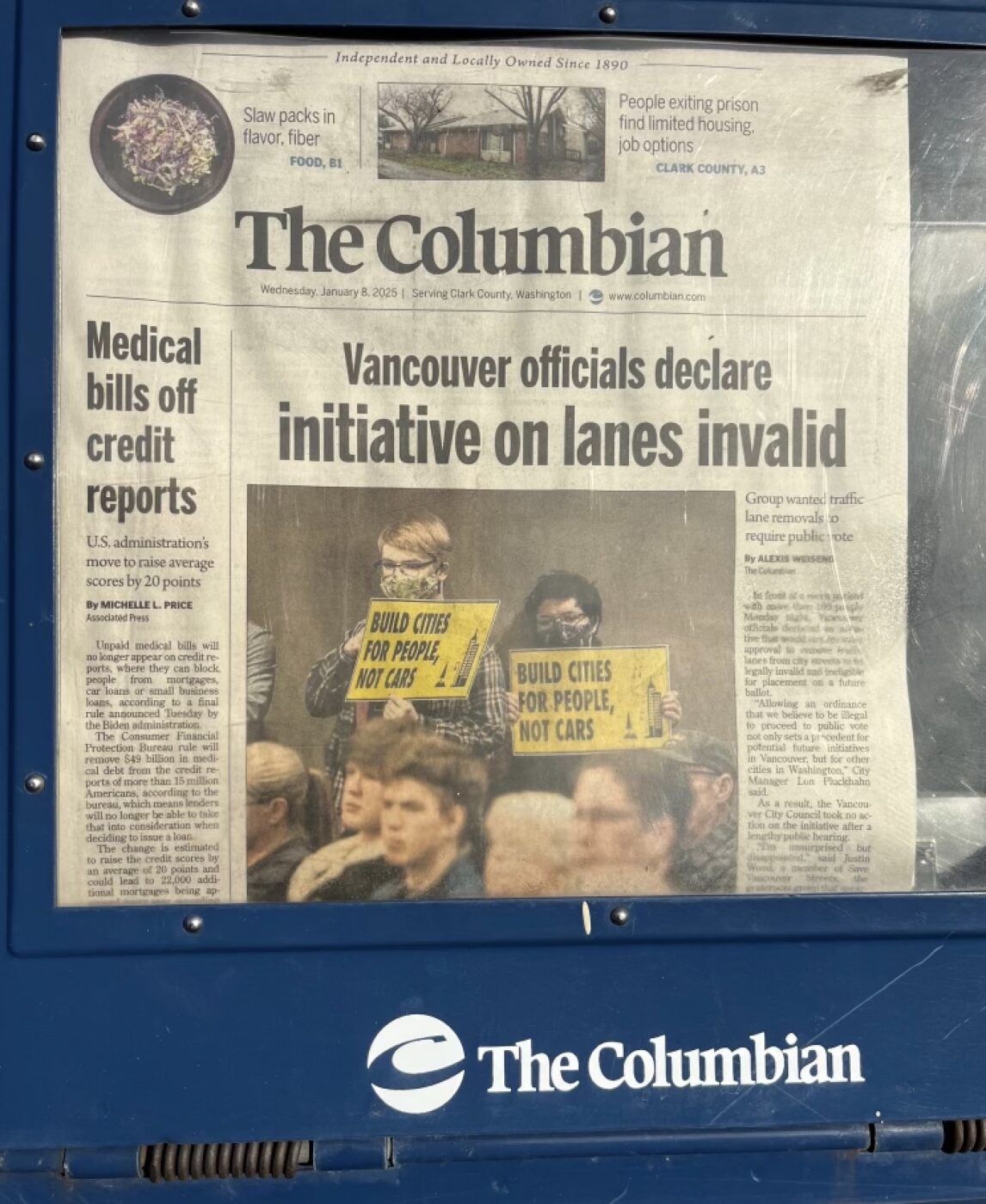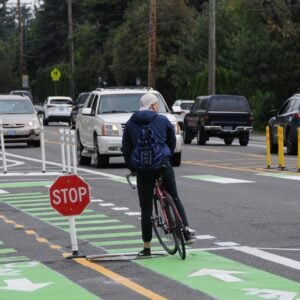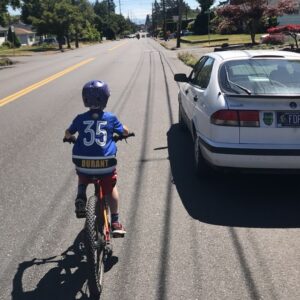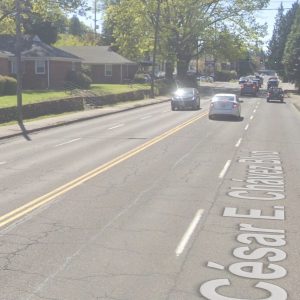A group of Vancouver, Washington residents who hoped to force a vote of the people prior to any road diet project saw their dreams dashed Monday night. Officials from the City of Vancouver said in their legal opinion, a proposal to change city code supported with over 6,500 signatures is simply illegal and cannot move forward.
Here’s how it was reported by The Columbian:
“In front of a room packed with more than 100 people Monday night, Vancouver officials declared an initiative that would require voter approval to remove traffic lanes from city streets to be legally invalid and ineligible for placement on a future ballot.
“Allowing an ordinance that we believe to be illegal to proceed to public vote not only sets a precedent for potential future initiatives in Vancouver, but for other cities in Washington,” City Manager Lon Pluckhahn said.
As a result, the Vancouver City Council took no action on the initiative after a lengthy public hearing.”
Jason Cromer is an advocate with Cycle Vancouver. He was at the council meeting Monday night and reached out to BikePortland to share his takeaways. He said the vibe in the room was “tense” but that a massive showing against the initiative petition told the story. Of the 57 people who testified on the issue, Cromer estimated about 45 of them spoke against the change in city code that petitioners seek. That huge majority that showed up spoke out in favor bike lanes, transit, safety, and “transportation freedom,” Cromer shared. “Those folks came from varying backgrounds, ages, and ethnicities. Meanwhile, the few that spoke in favor of the initiative made no effort to speak about safety, or transportation freedom, but focused purely on why a lane removal would add a few seconds to their commute.”
Justin Wood, a lead petitioner and representative of Save Vancouver Streets, the grassroots group that pushed the initiative, told BikePortland they plan to move forward with a lawsuit. He said their attorney disagrees with the opinion of the City of Vancouver’s attorney and that they believe their proposal is allowable under state law.
“This was a huge success for the city, and for the people of Vancouver. Whether or not you drive, giving people the freedom to choose how they get around is instrumental for combatting traffic, poverty, and safety issues.”
– Jason Cromer, Cycle Vancouver
“We are planning to move forward [with a lawsuit against the city] in large part to honor the work that the people did to collect the signatures.” Wood said he and other Save Vancouver Streets activists are not opposed to bike lanes. “I just don’t think it is being done right,” he said. “And I don’t think the city is doing a good job engaging and educating what they are doing and the value [of what they are doing].”
While Save Vancouver Streets raises money for the upcoming legal battle, urbanists in Vancouver like Jason Cromer are relieved and buoyed by the show of support at city council. “This was a huge success for the city, and for the people of Vancouver. Whether or not you drive, giving people the freedom to choose how they get around is instrumental for combatting traffic, poverty, and safety issues.”








Thanks for reading.
BikePortland has served this community with independent community journalism since 2005. We rely on subscriptions from readers like you to survive. Your financial support is vital in keeping this valuable resource alive and well.
Please subscribe today to strengthen and expand our work.
To think we have to keep fighting against those who want to drive fast and kill others
To think we still have to fight for the right to drive, while bikers and pedestrians recklessly ignore the elephant sized bulldozer about to roll them down.
I hope everyone realizes how much taxation comes from drivers and if you reduce that income for the state they’ll start taxing bikes next. Like needing licenses to be road worthy and yearly renewals
First you need to broaden your perception and realize that “drivers” _are also_ riders. Almost no one doesn’t drive sometimes, especially in SE Vancouver. I live in the project area. I bike AND I drive — so I pay. I am legion.
BTW, consider how you seem unable to express your position without invoking an explicitly violent image. Some reflection on character may be in order.
your BTW is perceptive. I see this all the time when motorists complain about pedestrians and bicycle riders — there’s an aggression and a physical threat in it, whether consciously or not. The same attitude is displayed in the ways people handle their vehicles when frustrated.
Most people who bike also drive cars and pay all the taxes that go along with them for roads and infrastructure.
What’s the mechanism by which this reduced “income for the state” will be realized? If it’s by greatly reduced gas sales and many fewer cars clogging our city, I can’t wait.
Do you have proposals to generate state revenue from pedestrians? Maybe a scheme for people to register their shoes?
Vexx: please be aware – in general and for most US communities – than much of our local transportation maintenance and operations is funded directly by local taxes (property, real estate, non-fuel sales tax etc.) so ALL local residents [with and without cars] pay for such. [The exception being sidewalk maintenance.]
And specifically for this project, if you care to read the background materials, see link: “How is this project being funded? Pavement improvements and road striping on McGillivray Boulevard will be funded through local tax dollars. Other subsequent project elements, such as crosswalks or vertical separators in the mobility lanes may be funded through a mix of local, state, and federal funds.”
https://www.cityofvancouver.us/wp-content/uploads/2024/05/Q_and_A_final.pdf
Driving isn’t a right, it’s a privilege. A privilege that some people take so much for granted that they act like it’s a right.
What isn’t a privilege, however, is to ride a bike or walk. I think you’re confused about who is fighting for their rights here.
I will also note that a cyclist next to you is one less driver in front of you
Yeah, because every single person who drives a vehicle is purposely out to kill someone.
Maybe we should outlaw pencils, knives, scissors, etc. because, you know, when ANYONE uses one of those they are out to kill someone with it.
We need to get people on our side, not roll their eyes at another over the top statement.
Yet there really *ARE* drivers who want to drive fast and heedlessly and who *DO* kill others. If you ride a bike, you see these drivers on every ride, unfortunately. They just haven’t killed anyone YET.
This kind of thinking (that drivers are “bad people who want to drive fast, kill others, and do bad things”) fuels the fires of transportation taking on the qualities and discourse of tribalized identity politics. Of course there are a small minority of people who are assholes that see recklessly driving massive vehicles as some sort of flex, but in reality most people in this country have been conditioned to see biking as a hobby rather than a “real” means of transportation. It’s a slow and frustrating process to get to the other side, but dehumanizing people isn’t the answer.
I don’t think it’s that most drivers are bad people who want to kill others. It’s that most drivers want to drive fast and disobey the speed limits, the consequences of that kills people when there’s a collision. That doesn’t make them bad people necessarily, but you shouldn’t handle them with kid gloves by divorcing the consequences from their actions. If you want to drive fast (you shouldn’t) then bear responsibility for the fact that you’re endangering everyone around you. Unfortunately, the vast majority of drivers routinely drive faster than the posted speed limit and don’t think or don’t care about how that endangers everyone around them.
It’s literally dehumanizing oneself to drive a car. You become a cyborg. But seriously, it is a form of alienation, which explains the lack of empathy or concern for the physical safety of vulnerable bodies while driving.
That’s probably even more true of using a phone or laptop for more than as few minutes.
Disagree. Being in a car takes a way your body’s connection to and influence from the environment and other people. You see for yourself the way it changes behavior.
You mean the way it radicalizes people and leads to inane arguments with total strangers? Road rage impacts a tiny percentage of drivers. Internet idiocy impacts a majority of folks online.
Could it be that the lack of empathy and homicidal tendencies of ‘murricans is a societal issue?
If you’re looking at per-capita data, part of the answer is the much longer distances Americans drive (much of it on dangerous 2-lane highways). Each increment of driving is increased exposure to danger.
A better comparison would be per-mile fatalities. The map would look more-or-less the same, but the stats would be somewhat less stark.
No. Our decisions *CREATE* the need to drive more, so that’s part of the problem. I don’t go to sleep worrying that my kid will be more or less likely to die based on whether they have to travel 3 or 1 mile, but the odds they will die that day on the roads, period.
You can reduce your personal odds of crashing considerably by driving safely and making smart choices. If you drive 50 miles on a rural highway every day, your risk profile is vastly different than if you drive 3 miles on urban streets. It would be interesting to compare urban driving fatalities between countries; I’ll bet they are much less different that the overall fatality rates because of the rural highway issue.
I’m describing how it is, not how I wish it were.
No, you are not “describing how it is.” You are “I’ll bet” _speculating_. You were pretty credible up until that telling self-indulgence.
Yes… I made a factual statement followed by a prediction of what that statement would mean for a comparative analysis I haven’t seen performed before.
As someone who is often (falsely) accused of supporting the status quo because I won’t indulge in the common fantasies many here prefer, I hope you can forgive me the occasional preventative disclaimer.
“Qué hai que hacer mas?”
–Goya
Good news, but I’m curious as to why the city attorney found it to be invalid?
It did not pass legal review by city lawyers back in April 2024. The initiative was then given back to the Save Our Streets lawyer. The geniuses in that group then made the conscious decision to make literally no change whatsoever to the text and then gather signature based on the exact text determined to be illegal.
thanks, df – that’s an interesting strategy.
Jeff S: read the staff report.
Said staff report.
Pretty much, if a local measure requires something against state law, they shouldn’t put it on the ballot. Washington’s Growth Management Act (statute) requires cities to plan for transportation choices.
Washington’s Supreme Court has held that the legislature delegated the power to act under the GMA to the legislative authorities of counties and cities, and that initiative rights do not exist when the legislature delegates the power to act exclusively to the legislative authority of a city, as opposed to the city as a corporate entity. That decisional law is binding on the City. Therefore, regulations under the GMA are not subject to the initiative process, including the adoption of comprehensive plans and enactment of development regulations to accomplish the Act’s requirements, regardless of the number of signatures an initiative proponent may have gathered.
My favorite part of this story was how you photographed the front page of The Columbian through a window and therefore didn’t need to buy it.
But seriously, kudos to the City of Vancouver council for rejecting the IP. Can you imagine the chaos that would ensue if people got to vote against everything and anything they didn’t like? “I don’t like vegetables – ban them.”
It’s not my photo, as it says in the caption.
Well then – good job, Jason!
The irony here is that our erstwhile reporters were getting around a physical paywall (a newspaper box) rather than the usual NYT and WP electronic kind that many of us regularly complain about.
Fred: I took the photo and sent it to BP. PS. Its a photo taken in a public space, etc.
Fine to have a “Bus lane” WHEN there’s a bus There’ to have priority.
BUT When lanes are empty (an hr at a time) NORMAL Travel & Cars MUST Be allowed FOR safety & traffic concerns!!! ;
Non-sequitur. Or else point to evidence that bus lanes are part of the McGillivray plan or other projects that bee-bonneted the “Save Vancouver Streets” folk.